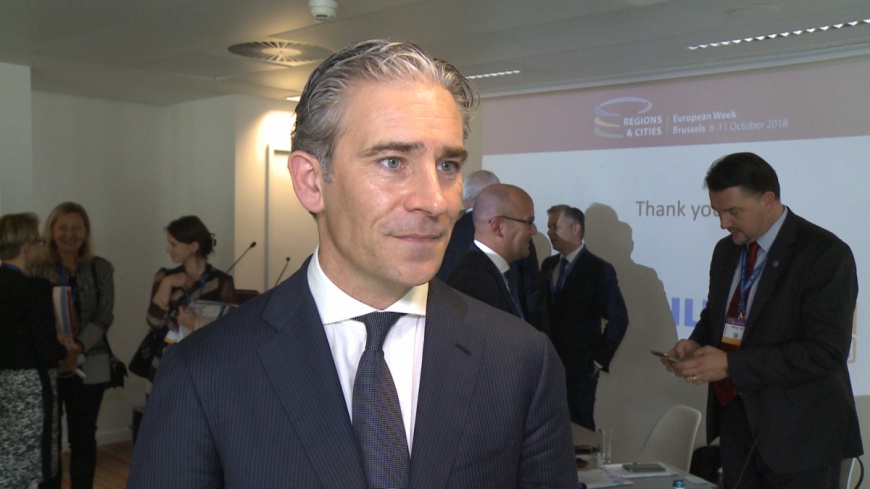Technology will improve access to physicians as well as treatment outcomes. Healthcare digitisation will be sped up by funding from the new EU budget.
Healthcare and its transformation towards new technologies depend heavily on the currently negotiated new EU budget perspective and funds earmarked for digitisation, social measures and healthcare. A portion of EUR 9 bn under the “Digital Europe” programme is likely to be invested in the healthcare sector. Reinier Schlatmann, Philips CEO for Central & Eastern Europe, emphasised that in order to meet the challenges faced by healthcare, it is essential to develop eHealth services, make decisions supporting their development and establish cooperation between entities from the healthcare sector.
“Digital transformation in healthcare is a must. This is one of the key directions if you think about the global healthcare trends as aging population, rise of chronic diseases and limited healthcare funds. Hence, there is a need to connect data within a system and make them easily accessible and transferable between various users, from the GP to the hospital or from patient homes to doctors at remote locations,” Reinier Schlatmann, Philips CEO for Central & Eastern Europe, told the Newseria Biznes agency.
As demonstrated in the “Patient in the digital world” report by PwC, digitisation and new technologies such as telediagnostics, artificial intelligence, dedicated applications and mobile devices will play an increasingly important role. As many as 60 percent of patients from Central and Eastern Europe are ready to use telemedicine already now.
“First of all, digitisation by providing data will enable improving treatment outcomes and quality of care. Secondly, it will improve access to healthcare – for instance, through telecare solutions connecting doctors and patients beyond geographical barriers. Last but not least, it will provide better data for the healthcare professionals, but also for the patients themselves, giving them more control over their own health,” said Reinier Schlatmann.
One of the solutions giving patients greater control over their medical data and the treatment process in Poland will be the Online Patient Account (OPA), due to be launched next year. The OPA will be a free-of-charge online app providing access to examination results, future appointments, patient history and medical leave certificates, all in one place. This is one of the governmental projects concerning healthcare digitisation. This year, a pilot e-prescription project was also carried out. From January 2020 electronic prescriptions are to be issued by all physicians in Poland. The next pilot project will concern electronic referrals and medical leave certificates, due to be launched on 1 December 2018. Eventually, these new electronic documents will completely replace the traditional L4 forms.
Jan Olbrycht, MEP thinks that healthcare and its transformation towards new technologies will depend heavily on the currently negotiated new EU budget perspective and funds earmarked for digitisation, social measures and healthcare.
“We hope that the new perspective will provide funds to actually strengthen this sector. On the one hand, this is about supporting various social programmes, based on the new pillar passed in Gothenburg which the European Social Fund focuses on. This time it will be extended to include elements typical for social measures and those related to healthcare,” said Jan Olbrycht.
In line with EC’s proposal, the new perspective will include the launch of the “Digital Europe” programme, the first such programme in history which will provide EUR 9.2 bn for digitisation projects in the years 2021-2027. A portion of the funds is to be spend on healthcare digitisation.
“The programme is still in design. On the one hand, support will be provided for basic scientific research, which is a continuation of Horizon 2020. On the other, we are talking about measures related to the so-called InvestEU investments, which are guarantees for various types of companies. I think that in the next perspective the healthcare sector will receive more considerable support than in the current perspective for 2014-2020,” said Jan Olbrycht.
Reinier Schlatmann, Philips CEO for Central & Eastern Europe, makes it clear that the digitisation of healthcare poses a number of challenges, e.g., in relation to data privacy and security, as well as reimbursement of telemedicine services. He explains that cooperation between different stakeholders in this sector is crucial for the successful digitisation of healthcare.
“The challenges faced by the healthcare sector are so serious, that no entity alone can meet them on their own. This is why we are partnering with government authorities, academic society and other healthcare stakeholders, to make sure that we consider all aspects and develop the best possible solutions,” said Reinier Schlatmann.
Professor Marek Gzik, Dean, Faculty of Biomedical Engineering, Silesian University of Technology, adds that EU funds have also helped further cooperation between science and business, resulting in some collaborative projects.
“The projects we are now after at the University are mostly implemented in partnership with business entities. Our next milestone undertaking is an EU-funded project we’ll be working on together with Philips. This project will help us build over a dozen superbly equipped laboratories to significantly enhance our scientific capabilities,” Professor Marek Gzik said.
Simona Curpan, Promotion Expert, Bucharest Ilfov Regional Development Agency, was excited to tell that in Romania, too, collaboration between public and private healthcare providers has translated into improved quality of life for patients, as it has generated innovative healthcare solutions. The Ilfov County that surrounds Bucharest also has many healthcare investment projects supported from Regional Operational Programme 2007-2013. These include projects to modernise and provide equipment for a district hospital in Ilfov, and to build several social centres within the County and in Bucharest itself, and new medical centres set up by microbusinesses which have bought the necessary equipment using EU subsidies.
“The new technologies such as the ones funded by EU funds – for example the projects financed by Regio for development of healthcare infrastructure – have a strong health impact for providing access to innovative healthcare for the European citizens and new jobs in the research area,” said Simona Curpan, Promotion Expert, Bucharest Ilfov Regional Development Agency.
Trade

Polish consumers are more satisfied than Americans, with the customer satisfaction level being close to 80 percent
For six years the customer satisfaction index in Poland has grown by over 17 percentage points to nearly 78 percent, and it currently exceeds the customer satisfaction levels recorded in the USA and the United Kingdom. Service quality and its growing significance among businesses have had a tremendous impact on customer satisfaction. For the eleventh time the Customer Service Quality Star titles have been awarded to entrepreneurs recording the best results in this field.

